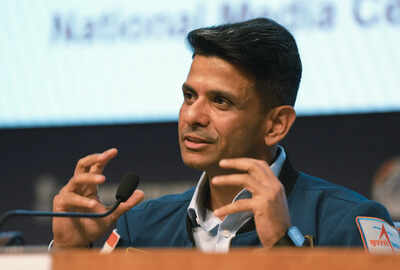ARTICLE AD BOX

BENGALURU: India’s space ambitions are being powered by human determination, global collaboration and a growing ecosystem that brings together govt, private industry and international partners, Group Captains Shubhanshu Shukla (Shux) and Prashanth Balakrishnan Nair (Papa) said here on Monday. Speaking at the International Conference on Space organised by CII and Isro, the two
Gaganyaan astronaut-designates
, drawing from their experience as astronauts-in-training, underscored how space exploration is not merely about technology but about people — their ideas, partnerships and shared purpose.Shux, who served as mission pilot for the Axiom-4 mission to the International Space Station (ISS), spoke about how the mission’s success depended on a wide network of experts from around the world. “Space transcends borders,” he said, recounting his training with SpaceX in California, Nasa in Houston and Florida, and programmes in Germany and Japan. He also highlighted the role of Indian researchers and Isro in designing experiments conducted aboard the station.
Lauding Isro achievements, he said: “Isro has been carrying the burden of space exploration on its own shoulders for so long. But now, I see a change — private industry is stepping up to build a thriving ecosystem.” Reflecting on a meeting with the Prime Minister, he pointed to India’s long-term goals, including establishing its own space station and landing on the moon by 2040 with a pool of 40 to 50 astronauts.Shux shared a personal moment that left a deep impression on him. During his time in space, he interacted with schoolchildren on three occasions, and each time at least one asked: “How do I become an astronaut?” “That speaks volumes about how far we have come. We are not just creating business but creating possibilities,” he said.Papa, while echoing Shux’s message, stressed on the central role of human connection in space exploration. “The presence of a human changes everything. It’s the reason we share experiences, learn from each other and push boundaries,” he said, drawing parallels between human observation in physics and the impact of experience on outcomes.He elaborated on the “whole of govt approach”, urging cooperation between govt bodies, entrepreneurs, academia and international partners. Using the analogy of farming, he explained how space is a master domain encompassing land, air, sea, cyber and AI fields, with diplomacy, information, military and economics as the tools.He described astronauts as data hubs, likening them to artificial intelligence platforms like ChatGPT that support decision-making. “Without this [human] ChatGPT, you can’t do anything,” he quipped, adding that Isro’s leadership, along with industry support, ensures the ecosystem’s growth.



.png)
.png)
.png)
















 3 days ago
9
3 days ago
9







 English (US) ·
English (US) ·